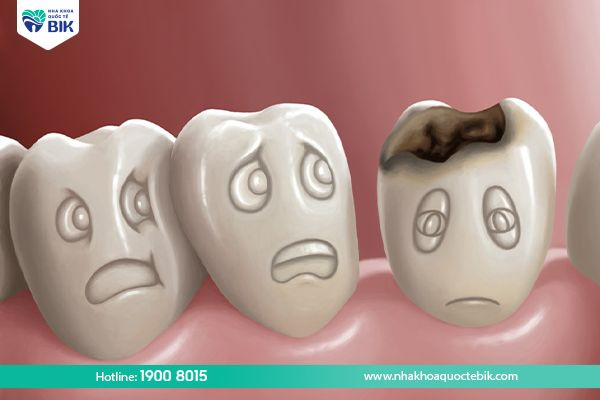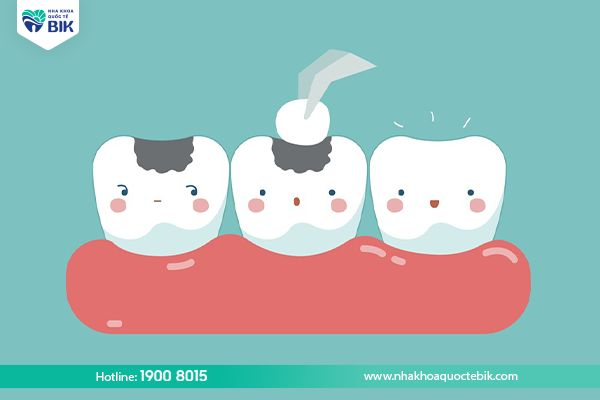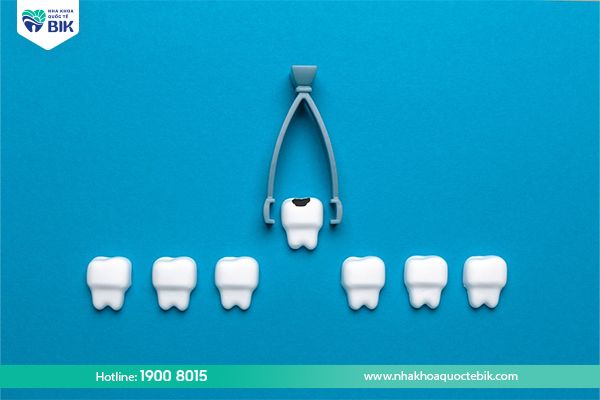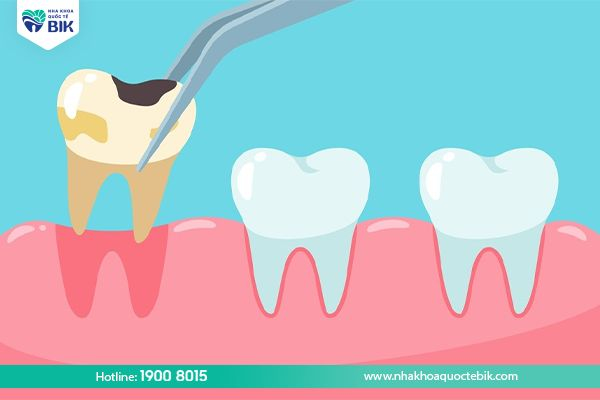Tooth decay is a very common disease today and any tooth in the jaw can be decayed, so wisdom teeth are no exception. Although wisdom teeth only grow between the ages of 18 and 25, they can still be decayed due to many different causes. The condition of wisdom teeth decay can be easily recognized, but if not treated, it will lead to persistent pain and discomfort.
1. Causes of wisdom teeth decay
Wisdom teeth, also known as tooth number 8, are the last teeth to grow in the jaw. Because this is the last tooth to grow and is located deepest in the jaw, oral hygiene will be more difficult. Wisdom teeth also often grow crookedly and hidden. Therefore, when eating and drinking, leftover food can easily get stuck in the gums. If not cleaned regularly, it can cause tooth decay.
Just a newly emerged tooth can cause bacteria in the oral cavity to penetrate the teeth and gums, causing tooth decay and gingivitis. Food debris when stuck will cause bacteria to accumulate more and more, causing irritation and swelling of the gums.

2. Signs of wisdom tooth decay
To recognize wisdom tooth decay, patients can rely on a few common signs as follows:
– Sensitive teeth: When eating or drinking foods that are too hot, cold or sour, patients will feel pain and sensitivity at the location of the decayed wisdom tooth.
– Toothaches: Toothaches that come continuously or intermittently even though the tooth is not subjected to any external force make the patient uncomfortable.
– Change in tooth color: This is an easily observable sign from the outside, especially if the wisdom tooth is decayed in the lower jaw. At that time, the patient will see gray, brown or black spots on the tooth surface – this is a sign of wisdom tooth decay.
– Bad breath: At this time, bacteria that cause tooth decay will form holes on the tooth surface. Due to food being stuck and at the same time the cavity is often not cleaned thoroughly, bacteria nests grow, causing an unpleasant odor.

3. Are wisdom teeth dangerous?
The presence of wisdom teeth has almost no functional significance in the jaw cavity and also causes negative impacts on general oral health. If unfortunately the wisdom tooth number 8 is decayed, the patient may be at risk of facing the following complications:
– The tooth appears with severe pain, the patient has difficulty opening the mouth as well as affecting daily chewing activities.
– The bacteria that cause tooth decay attack the inside of the tooth, follow the soft pulp and spread deep into the jawbone, gums and surrounding areas. More dangerously, it can lead to necrosis of the tooth pulp.
– Tooth decay can spread to healthy teeth next to it and cause damage. If left untreated for too long, tooth decay can destroy adjacent teeth and lead to their extraction.

In addition to the risk of tooth decay, wisdom teeth can grow crooked, grow in the opposite direction or grow underground. From there, it greatly affects the structure of the jawbone and surrounding teeth. Therefore, in the case of wisdom teeth growing, most doctors will advise not to maintain it in the jaw.
4. Should a decayed wisdom tooth be filled or extracted?
Doctors will recommend treatments for decayed wisdom teeth depending on many different factors such as:
– Wisdom tooth growth direction
– How severe or mild the wisdom tooth decay is
– Risk of affecting adjacent teeth
The doctor will prescribe filling the decayed wisdom tooth if it is only slightly decayed and growing straight. The tooth filling method will help seal the cavity and prevent bacteria from attacking or food from sticking, making the cavity worse, even into the tooth pulp, as well as preventing it from spreading to adjacent teeth.
The steps for filling a decayed wisdom tooth are similar to those for filling other normal teeth. First, the dentist will perform a general examination and clean the mouth thoroughly to check the condition of the decayed wisdom tooth. Then, use specialized dental tools to scrape off the decayed and infected tooth area. Finally, the cavity on the wisdom tooth will be filled with a smart filling material and is often the same color as the real tooth to ensure aesthetics for the patient.

However, because the position of wisdom teeth is quite sensitive and closely related to the nerves, doctors will usually prescribe a film to check the level of tooth decay and the direction of wisdom tooth growth most accurately. Then, based on the direction of tooth growth, whether it is straight or stabbing into other teeth, the doctor will develop an appropriate treatment plan.
Therefore, when the tooth decay has penetrated deep into the tooth and spread to form a large hole affecting the tooth pulp, the doctor will prescribe extraction to completely treat the decayed wisdom tooth as well as protect the health of the adjacent teeth or the entire oral cavity.
Because wisdom teeth grow in the innermost part of each jaw, this is a particularly important position due to the presence of many nerves, so when performing any procedure, including filling or removing teeth, caution and precision are required. Therefore, to ensure safety, patients should go to reputable dental facilities for treatment.

5. Is it okay to remove decayed wisdom teeth?
Decayed wisdom teeth cause pain and discomfort, making it more difficult for patients to perform daily activities such as eating and communicating. If not treated immediately and left untreated, this condition can cause damage to neighboring teeth as well as negatively affect the oral cavity in general.
The method of removing decayed teeth does not affect the jaw but can also help limit future complications caused by tooth decay. When wisdom teeth are missing, it does not cause difficulties for the patient in daily chewing and does not affect the jaw.
Therefore, any tooth position, including decayed teeth, can be decayed. If the wisdom teeth are severely decayed, grow in the wrong position, grow crookedly, grow underground, grow horizontally, … the dentist will prescribe extraction to treat the pain, limit the possibility of recurrence later as well as ensure oral health.

6. How to prevent wisdom tooth decay
To effectively prevent wisdom tooth decay, you should note the following:
6.1. Proper oral hygiene
– Brush your teeth at least twice a day, especially after each meal to completely remove plaque on the tooth surface, avoiding the formation of dense tartar that creates a favorable environment for bacteria to grow and cause tooth decay.
– Use a soft-bristled toothbrush, brush your teeth in a circular motion to limit damage to the gums.
– Replace your toothbrush at least every 3-4 months to avoid bacteria buildup that causes wisdom tooth decay.
– Combine the use of dental floss or a water flosser to completely remove food debris deep in the gaps between wisdom teeth, where the toothbrush cannot clean.

6.2. Reasonable diet
It can be said that sweet foods containing a lot of sugar as well as foods containing a lot of starch are one of the leading causes of wisdom tooth decay. Therefore, you should limit these foods in your daily meals. In addition, you should also limit carbonated drinks, spicy foods, sour foods, etc. to avoid damaging tooth enamel.
So wisdom tooth decay is a disease that comes from the position of wisdom teeth that is difficult to clean, causing plaque to accumulate over time, causing tooth decay. When experiencing this condition, patients should go to dental facilities to be examined and treated properly by doctors, preventing dangerous complications that may occur or even having to remove decayed teeth.


















